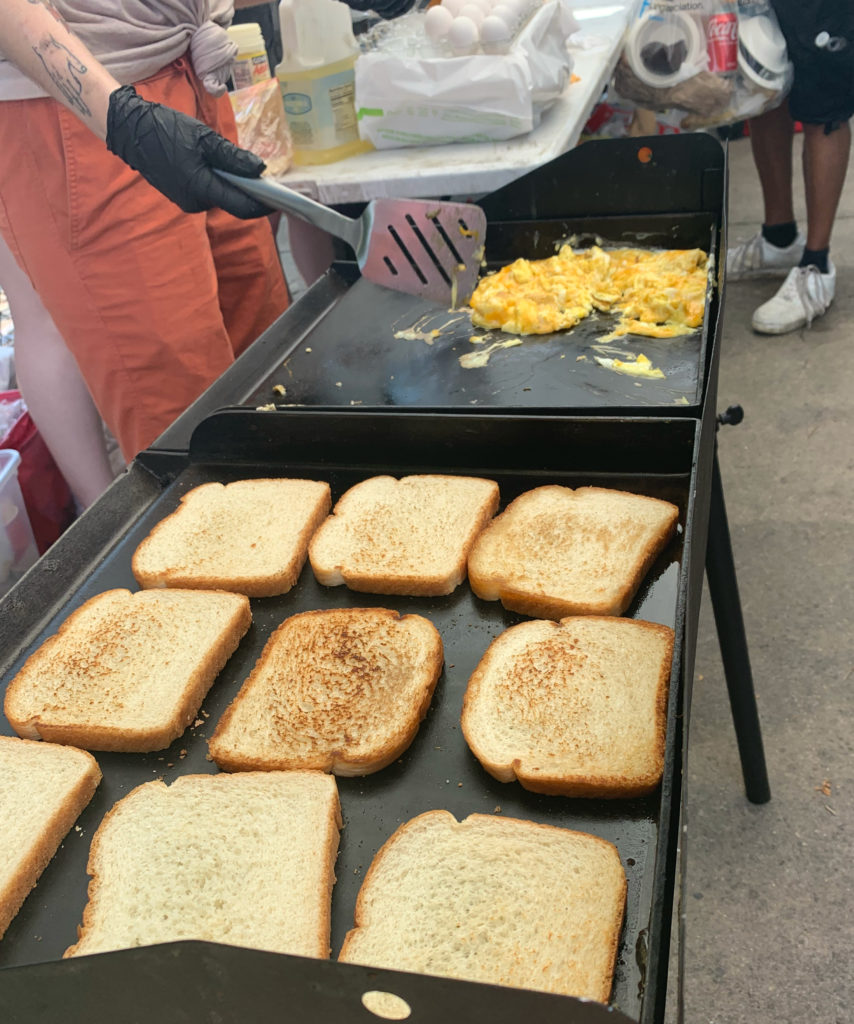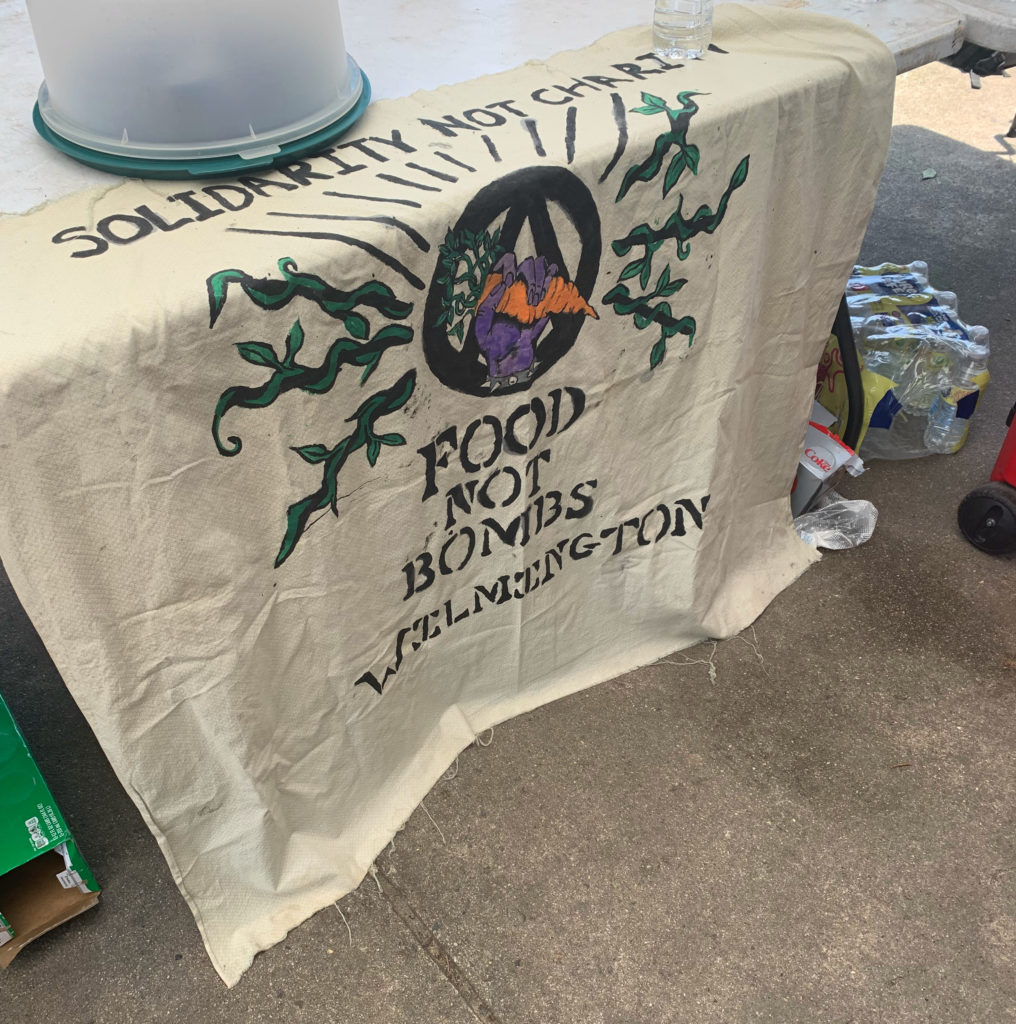My connection to Food Not Bombs started when I moved to Delaware in 2020. When I arrived, I was desperate to find a community, and I scoured the internet for anybody doing anything. I knew moving at the beginning of a global pandemic would be challenging, but it still felt like moving to a ghost state. I happened upon Food Not Bombs’ Twitter account and direct messaged them, and then through a series of small connections from that conversation, I found myself connected to Network Delaware and the Delaware Call. I made a few meals that year for FNB’s Saturday events, but my work schedule and having young kids made consistency difficult.
I was excited to reconnect with the group recently, and even more excited that several group members were willing to talk to me for this piece. Solidarity work is more important every day as climate change takes hold and our global food chains show how vulnerable they are to those changes.
We met up on a Zoom call to more easily accommodate everyone’s schedule. Because Food Not Bombs is a consensus organization, all members have equal say in what the organization does. The members I talked to were Brenna Christenbury, Desiree Hendrix, and Ash (whose name has been changed to protect their privacy).

How did you hear about FNB Wilmington and what drew you to joining the group?
(Brenna) I was a UD student and so I think I heard about them through a benefit show or just like an Instagram post. I had friends who would organize with them and talk about Food Not Bombs, and I wasn’t super familiar with what that meant really or what it was until I joined sometime in 2020. I’ve only been an active member for the past couple of years. I just really – I like giving food. It feels like a really direct way to help and do something. I like the mutual aid and the solidarity over charity aspects of it.
(Ash*) My boyfriend and I were trying to see what was to come as a result of the George Floyd protests that had happened, and kind of had heard of Food Not Bombs through those protests, and in particular through a specific case of police violence. So that kind of, like, was what introduced me to the group – them raising awareness of what was going on. [And] also providing food and being a part of the community versus … just simply giving resources or … just doing it from a charity standpoint. It stood out to me in that way because I had also had a background in collaborating with non-profit organizations in college, and saw a lot of issues there. So that was kind of what drew me in a lot.
(Desiree) I did a little bit in 2018 [pauses] or end of 2017? … with the old Food Not Bombs New Castle before it turned into Food Not Bombs Wilmington. I found them on Facebook. I had just gotten back from studying abroad in London, and I was part of an international protest against pharmaceutical greed and I was looking for grassroots organizations in Wilmington to join. I’m from Wilmington, pretty close to the area we’ve historically served in. And I really care about food justice as someone who doesn’t have a car and finds it really difficult to get to grocery stores and make sure I have enough food even for myself.
I broke off for a bit and then re-joined again as the pandemic started in March. It was still a really important cause to me, as someone who went into food service and saw how much waste that food service and restaurants were creating when all of that could go towards feeding somebody else.
When you say solidarity over charity, what does that mean to you, either as an individual or as an org?
(Ash) I don’t want to be the only person to speak on this for sure, I think everyone should definitely speak on this. The idea of it not being a hierarchy is really important, and it being about the fact that you’re a community member as well.
(Desiree) For me, that means that we don’t have those “means testing” I think is what a lot of groups call it, where they make sure you don’t make X amount of dollars or you have to live in a certain mile radius where everything happens. For that, we’re focusing on helping everyone who stops by, and creating a larger community that can connect with each other, and form connections.
I wasn’t here for it, but Stop Asian Violence Delaware did something together [with Food Not Bombs Wilmington]. It’s about creating those networks between individuals with those larger projects, and not just being really disconnected. A charity to me is just like, “Oh we’re helping out these poor people, but we don’t need the help ourselves.” Whereas I have a nice brunch every Saturday morning at the meals and it’s really great.
(Ash) I agree with Desiree on that one. I was, for the past year, working at a nonprofit organization. And it felt like we were treating whatever marginalized people we were helping like they were at some sort of deficit, like they were lesser in some way. Versus sharing, where you understand that these people are also part of your community; that members in our group can easily struggle as well, and it’s about uplifting each other, which is just, I don’t know, very hard to find.
(Brenna) We also have a lot of people who will come to the meals to bring hot meals to more people. It’s community building and empowering in that way. You can ask for five sandwiches, we’re gonna give you five sandwiches. We have a lot of people come and bring food out to other places. That’s part of the solidarity thing versus charity. It’s solidarity in that everybody eats.
One of you mentioned that you worked in the food industry and saw all of that waste. I used to live in Pittsburgh and there was an organization called Food Rescue 412, and that organization existed because grocery stores literally just throw away perfectly good food all the time. And the excuse is “Oh, we don’t want to get sued if we donate it and then they get sick.” But there’s actually a law [The Good Samaritan Act of ‘93] in place to cover that.
My question would be, what part does Food Not Bombs play in stopping some of that waste from happening, and what do you wish more businesses in Wilmington did with their extra food?
(Desiree) For a while, dumpster diving was definitely a big way of Food Not Bombs getting actual produce. I think we’re all banned from dumpster diving at one of the Aldis [laughs]. I think it was using the Good Samaritan Act and showing it to the Newark Co-op, and that’s how we got that produce connection. That’s where we get most of our produce still, if I’m not mistaken. It’s a surprisingly large amount of produce, ‘cause we can have our free store on Thursdays, and still have at least some produce leftover to be the base of meals on Saturdays.
(Ash) This past week was particularly good too. We had a box of bread, and a box with apples and oranges. And one with a lot of bell peppers.
(Desiree) That part really makes me so mad, because bell peppers are so expensive.
(Ash) And they still look so pretty when they give them to us. And the bread too.
Which coop was that that you mentioned?
(Desiree) The one down in Newark on main street. [Newark Natural Foods]
(Ash) Haven’t we also gotten donations from Kranz Hill [Farms] as well?
(Brenna) Yeah, we get stuff from Kranz Hill too every once in a while. I have not talked to John this season, but they’re another one.
(Ash) There are definitely other people who have offered donations, I think they had to shut down recently due to the pandemic, but they gave us a lot of bagels every week so we could use those to make the breakfast sandwiches on Saturdays, which was really nice. I know occasionally Little Goat Coffee has given us coffee as well.
What are ways that both food industry businesses and individuals can get involved in the work that you’re doing?
(Brenna) I would say for businesses, email us at [email protected]. If you’re an individual, just DM on Instagram.
(Desiree) I check the email daily.

What would that involvement look like?
(Brenna) That could be donating money, direct funds. That could be donating your time. We always tell people the best thing to do is to come to the Saturday meal. Or to the Thursday free store as well. The best way we tell people is to come out to that. We have some projects in the works, but they’re not ready.
(Desiree) The best bet [for businesses] is if they just send an email, if they need something to get picked up, we can figure it out; if they want something to be dropped off we can figure it out. We can work around businesses’ needs. Like, we pick up the produce every week from [Newark] Natural Foods. I’ve gone and picked up diapers, and hit up other businesses for stuff.
(Brenna) I would go to Kranz Hill. Just whoever’s got a car is doing it. Free Food For All recently posted something on Instagram about a business giving away containers, and that turned out to be Harvest Market in Hockessin, and so I reached out to them and went and picked up the containers. We have a bunch of gloves now, a bunch of deviled egg containers. So it just depends on who’s putting what out there.
Over the year, two, or three – however long you’ve been involved – what impact have you seen? What stands out to you as, “This is why I keep doing this; the solidarity really means something”?
(Ash) Understanding that I also benefit greatly from being a part of this is absolutely the reason to keep doing it. Off the top of the head, an example would be meeting people who end up coming out to these meals and through that I develop like an informal skill-share where I’m giving this person a sandwich that we make off the grill, and they’re teaching me sign language. That’s pretty amazing there. That’s a really fun thing for me to be able to learn and be able to community, and of course also develop a friendship as well.
(Desiree) So the Wilmington Bail Fund actually started from me and several other previous Food Not Bombs members. So the impact is that we are able to find other people to work with and create new projects to help Delaware and Wilmington.
(Ash) I feel like that’s a huge part of that. Just a huge, huge, important part of that. Not only are we able to create this network and sense of community, but we’re able to do something with that as well. Absolutely.
That’s a really powerful thing.
As far as upcoming events, is there anything outside of the weekly stuff?
(Brenna) I’m in the middle of trying to plan a fundraiser show. Don’t have a date for that. (email Desiree)
(Ash) We could mention the community fridge as well, when we plan to do more of a solid opening, a “paint day” as well.
(Brenna) The hardest part of mutual aid is planning and following through. We just gotta pick a day and do it.
What is this pantry fridge thing?
(Brenna) Currently we need to get it running, it’s almost ready.
(Ash) The fridge that we got was donated, of course, and it’s usually an indoor fridge, and certain fridges don’t have compressors that are built to withstand certain temperatures. So we hope to have a digital temperature logger on the fridge that can be ordered soon. And at that point, connecting with the person who wants to be able to record that data wirelessly.
And where is the fridge going?
(Brenna) It’s where the Free Store is, on 9th and Kirkwood. There’s a purple structure that some members built. They did a great job. We’re hoping to be able to put dry goods there. Some people have expressed concerns about the safety of the food, because other people from other neighborhoods come in and just kind of mess with stuff. So we want to get a number lock, and then give out that number to people who come out to Free Store regularly who we are familiar with and we know aren’t going to mess with the food.
And hopefully we can fill that with more produce and make that a more regularly accessible thing, and start accepting more donations. We’ll have somewhere to put the food to make it readily and easily accessible to the community.
I know there’s a few community fridges, and yeah, it’s just important, because not everyone can drive to the Food Bank.
(Brenna) I went to the Free Food For All event and talked to Jamila, and she said one of the problems they’re having with their fridges is that they’re having trouble keeping it stocked. So I know that this is something we need to talk about more as a group. I want to organize cooking meetings where we make meals and stock the fridge.
I joined the Saturday meal on the 21st, bringing some cold drinks and a cooler with a few ice packs. Other additions included a bag of Starbucks past-date-but-still-perfectly-good bags of coffee, a couple of bags of pretzels from Philly Pretzel Factory, bunch of snacks and sodas and waters, fresh fruit, a bean salad, and the FNB Wilmington grill which this week served up egg sandwiches. Some people grabbed food as they walked past, while others caught up on conversation. Several asked if they could take two of something and it was freeing to encourage them to take however much they wanted.
For me, the summary of FNB’s solidarity was reflected in one particular interaction. Someone who had just been handed a fresh, grilled egg and cheese sandwich said to the person behind the grill, “You have a beautiful spirit,” and the person quickly and genuinely replied, “So do you!”
Upcoming Events
Mutual Aid and Benefit Show
A concert benefiting FNB Wilmington and Free Food For All Delaware
Sunday, May 29, Squeezebox Records, 1901 W 11th St, Wilmington DE, 19805
3pm (masks indoors)
$8-$15 entry

